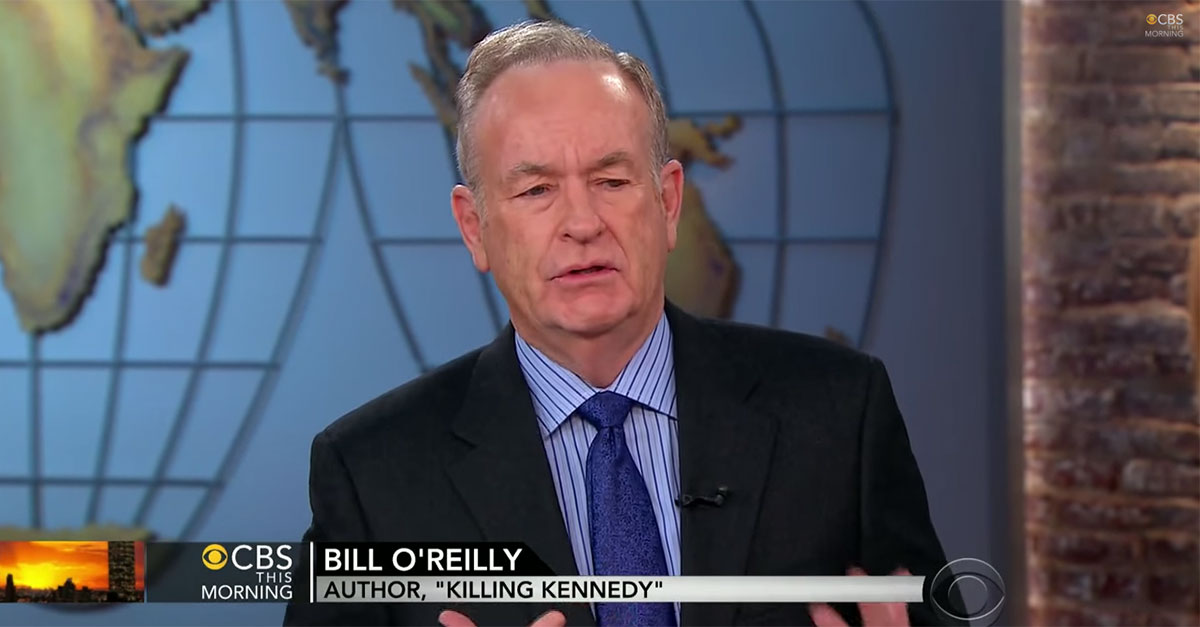 Fox News host Bill O'Reilly is furiously spinning amid mounting evidence that he has repeatedly lied about his professional history as a journalist.
Fox News host Bill O'Reilly is furiously spinning amid mounting evidence that he has repeatedly lied about his professional history as a journalist.
On Wednesday, the Fox anchor put forth a laughable explanation to justify his claim to have seen nuns gunned down in El Salvador even as new evidence emerged casting doubt on his claim to have been at the scene when a friend of Lee Harvey Oswald committed suicide.
After it was revealed that O'Reilly could not possibly have witnessed nuns being gunned down in El Salvador, as he has repeatedly claimed, O'Reilly argued that he only meant that he had seen pictures of nuns who were killed before he even arrived in the country in 1981. That disingenuous explanation follows the pattern O'Reilly set in response to earlier reporting, led by Mother Jones, that he had been in an active combat zone “in Argentina, in the Falklands.” O'Reilly now claims he never meant to suggest that he was in the Falkland Islands during the war, only that he was in Argentina when a violent protest broke out.
And tonight, The Guardian is reporting that O'Reilly's former Inside Edition colleagues “have disputed his account of surviving a bombardment of bricks and rocks while covering the 1992 riots in Los Angeles.”
As questions regarding Bill O'Reilly's credibility linger, more individuals have stepped forward casting doubt on his claim he was at the scene when a figure linked to President John F. Kennedy's assassination committed suicide.
Significant evidence contradicts O'Reilly's repeated statements that in 1977 he personally “heard” the self-inflicted shotgun blast that killed Lee Harvey Oswald's friend, George de Mohrenschildt, Media Matters reported on February 24. Despite the heavy scrutiny of O'Reilly's claim, he has offered no evidence to confirm that he was outside the residence and “heard” the shot. By contrast, the detailed police report filed after de Mohrenschildt's suicide refutes the notion that O'Reilly could have been at the residence at the time of death. It states that three people around and inside the house didn't hear the gunshot and also didn't see any strangers around the residence. O'Reilly is not mentioned at any point in the report. A congressional investigator's memoir and tapes of his conversations with O'Reilly also undermine O'Reilly's claims.
Byron Harris, who earlier this week told Media Matters he “guarantee[d]” that O'Reilly was not in Florida at the time of the suicide, now says he thinks O'Reilly was in Florida around that time, though Harris maintains his belief that O'Reilly was not at the scene when de Mohrenschildt committed suicide. His story shifted after talking with Bob Sirkin, an O'Reilly ally and freelance reporter who previously worked for Fox News. Sirkin described himself as one of the few people at WFAA who got along “very well” with O'Reilly, and said that he spoke to O'Reilly earlier this week when news of his JFK claim broke.
Sirkin claims to have reported from Florida with O'Reilly at the time and says O'Reilly told him he had heard the gunshot that killed de Mohrenschildt. Sirkin confirmed he wrote a September 2012 blog comment claiming he visited Florida with O'Reilly prior to de Mohrenschildt's suicide. That entry makes no mention of O'Reilly hearing the gunshot or being present at the location of the suicide.
And three new sources -- a WFAA colleague, a former Newsweek bureau chief, and a videographer who said he was O'Reilly's Florida cameraman -- also cast doubt on O'Reilly's story.
In an interview with Media Matters on Wednesday, Doug Fox, who worked for WFAA from 1974 to 2003, cast further doubt on O'Reilly's claim to have been at the scene.
“Sirkin and O'Reilly were both going to Florida to interview de Mohrenschildt,” Fox said. “I think O'Reilly called and said the guy is dead before he could even get to him. He never mentioned to my knowledge hearing the gunshot that took de Mohrenschildt's life.”
Frank Eberling, an Emmy Award-winning filmmaker who has served as an adjunct professor in the Palm Beach State College Film Department, told Media Matters he had worked with O'Reilly and Sirkin when they reported from Florida around the time of de Mohrenschildt's death. Eberling said that while he is unsure, he thinks O'Reilly arrived in Florida the day after the suicide.
Eberling also said that he does not remember O'Reilly telling him that he had overheard the death. “If he had told me, that is something I would have remembered,” he said.
Sirkin told Media Matters he didn't recognize Eberling's name, but acknowledged he wasn't sure who their freelance cameraman was in Florida.
Even Sirkin, who told Media Matters he was “not really interested” in going on O'Reilly's show to corroborate his claim, acknowledged that he cannot confirm O'Reilly's whereabouts at the time of de Mohrenschildt's suicide, noting that he was not with O'Reilly at the time.
Hugh Aynesworth, a former bureau chief for Newsweek and the Washington Times, strongly refuted O'Reilly's JFK claim. The Dallas Observer reported on February 26 that the de Mohrenschildt suicide scoop came from the Dallas newspaper “where Aynesworth was working. It was his story, he says. He did go to Palm Beach, and he says now there was nobody around the news scene that day named Bill O'Reilly.” Aynesworth, a “JFK assassination expert,” says he was on the scene “within hours” of the suicide, adding, “I didn't see him [O'Reilly] there. I was at the police department or that house for hours, and he just was not there.”